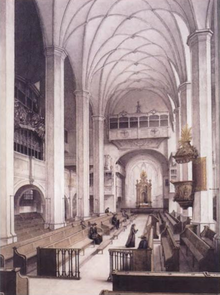Schmücke dich, o liebe Seele, BWV 180
|
Schmücke dich, o liebe Seele BWV 180 |
|
|---|---|
| Chorale cantata by J. S. Bach | |

Thomaskirche, Leipzig
|
|
| Occasion | 20th Sunday after Trinity |
| Performed | 22 October 1724: Leipzig |
| Movements | 7 |
| Cantata text | anonymous |
| Chorale | "Schmücke dich, o liebe Seele" by Johann Franck |
| Vocal | SATB choir and soloists |
| Instrumental |
|
Schmücke dich, o liebe Seele (Adorn yourself, O dear soul),BWV 180, is a church cantata by Johann Sebastian Bach. He composed the chorale cantata in Leipzig for the 20th Sunday after Trinity and first performed it on 22 October 1724.
The cantata is based upon Johann Franck's hymn "Schmücke dich, o liebe Seele", with a melody by Johann Crüger, a hymn for the Eucharist. It matches the Sunday's prescribed reading, the Parable of the Great Banquet from the Gospel of Matthew. The first and last stanza are used unchanged in both text and tune: the former is treated as a chorale fantasia, the latter as a four-part closing chorale. An unknown librettist paraphrased the inner stanzas as recitatives and arias, quoting one stanza of the hymn within a recitative. Bach scored the cantata for four vocal soloists, a four-part choir, and a Baroque instrumental ensemble of different flutes and oboes, strings and continuo. All movements are set in the major mode, in keeping with the festive text, and several movements resemble dances.
Bach wrote the cantata in his second year in Leipzig as part of his second annual cycle of chorale cantatas for the 20th Sunday after Trinity. The prescribed readings for the Sunday were from the Epistle to the Ephesians—"walk circumspectly, ... filled with the Spirit"—(), and from the Gospel of Matthew, the Parable of the Great Banquet (). The German term used in the Luther's Bible translation is Hochzeitsmahl, literally "wedding meal".
...
Wikipedia
